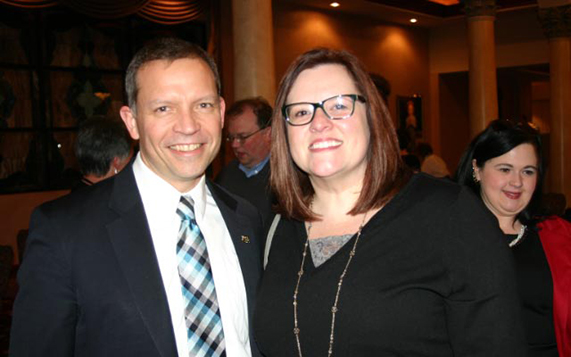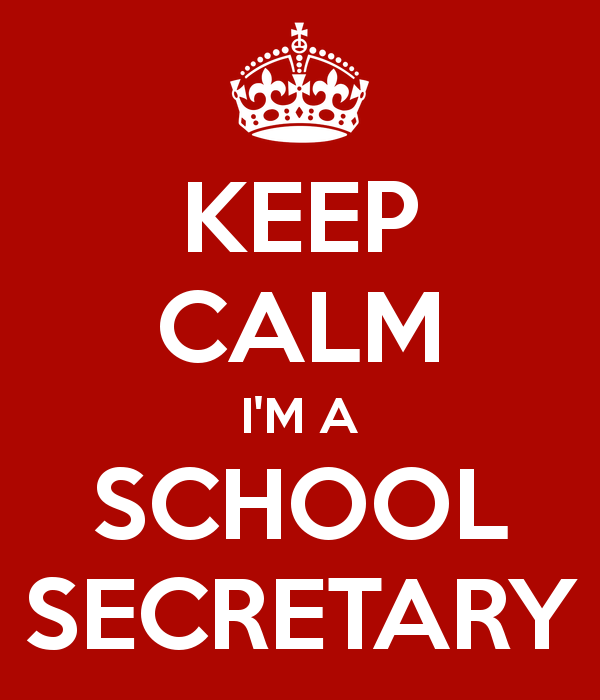The Value of Membership
Members tell their stories of why they value OEA membership. By being a member of OEA, educators have the power to stand up for their students. OEA is an advocate for high quality public education for all students.
The Power of Participation
By Julie Rine, Minerva Local Education Association
W hen I started teaching 20 years ago, some colleagues taught me some very important tricks of the trade: how to get on the janitor’s good side, how to sweet talk the secretary into making last minute copies for me, how to drink cheap beer (on a young teacher’s salary, that might have been the most important lesson!).
hen I started teaching 20 years ago, some colleagues taught me some very important tricks of the trade: how to get on the janitor’s good side, how to sweet talk the secretary into making last minute copies for me, how to drink cheap beer (on a young teacher’s salary, that might have been the most important lesson!).
And then one of those friends invited me (dragged me) to a negotiations committee meeting. I was a member of the association, but really had no interest in getting involved, primarily because I had absolutely no idea what the union did or how it did it.
I remember he said being on the negotiations committee was a good place to start, because one of the most important jobs of the union was to represent the teachers at the table, to work with the administration of the district to make gains that would better serve the students and teachers of the district.
Looking back, I know that he was trying to get younger teachers involved in the work of the local association, as I do now. It’s important that the ideals and goals of the union pass down from one generation to the next and that we keep getting stronger each time the leadership changes. That colleague is retired now, but I think he would be proud of my involvement with the union that all began with one meeting where we brainstormed the needs we wanted to present to the administration at our contract negotiations that year.
Since then, I have served as Vice President and an at-large representative for our local association (we really need a more flattering title for that position!) and I have represented our association on various committees. I have helped screen local political candidates, attended regional events such as the legal update dinner and the annual meeting with state legislators, and last year I participated in the Representative Assembly in Columbus.
“We might be individuals with different beliefs, experiences, and priorities, but together we form a unit to be reckoned with, one that proudly uses its power and strength to advocate for Ohio’s kids.” — Julie Rine
I’ll admit that the first time I went to the ECOEA Legal Update dinner, it was because it is held at a local restaurant known for good Amish cooking and fantastic pies. I still go back every year, but not just because of the pie; it is truly interesting to hear what court cases and legal issues are affecting teachers in Ohio (and frankly, sometimes quite horrifying!).
This was the first year that I attended the dinner with legislators, but it will not be the last.
To actually have conversations with the men and women who have the power to make decisions that affect education in Ohio is an opportunity that cannot be taken for granted. The State School Board members who joined us that night seemed just as frustrated as we are at the recent actions of several members of the Board.
The legislators answered our questions as best as they could, and it was evident that many of them truly have a heart for education and a desire to stop the madness that public education in Ohio has had to endure under Kasich’s leadership.
Not every question we submitted was presented to the panel that night due to time constraints, but every single submitted question was sent to the panel members afterward. Those men and women now know exactly what issues evoke our anger and our passion, and they will be able to better represent us  because of that three-hour event.
because of that three-hour event.
It was by default that I became our local association’s delegate to the Representative Assembly last year. Each spring, my local asks for people to indicate interest in serving on various committees or being our delegate to the RA. No one wanted to be the delegate. We have a very small budget for the delegates, and it’s actually possible to lose money by going to both fall and spring assemblies. I had no idea what to expect, but I and one other colleague agreed to go.
We held the election in the fall to make it official, but we were the only options. Because I was unable to attend the ECOEA RA prior to the one in Columbus, I did not get the delegate handbook until I arrived, but if I were to do this again, I would definitely get the handbook earlier; it explains what will be voted on, and gives many other details that would have kept me from going in blind.
At the assembly, I saw our union in action. There were the usual organizational tasks, budget reports, etc. (and I’ll confess this English teacher might have zoned out on the numbers, but I’m sure the math teacher delegates were paying attention!). What fascinated me most was the presenting of new business, new concerns and suggestions of issues on which the OEA should take an official position.
One of the issues that came up that year was whether or not there should only be one assembly per year, partly because of the financial strain two meetings can put on small districts like mine. On this issue and others, delegates from all over the state and from every local association could and did approach the microphones to make their opinions known, to make suggestions for language changes, and to offer compromises when the supporters of two opposing viewpoints seemed to be at complete odds with each other. The debates were respectful and orderly; a vote was held and the voices of our members were heard.
One way of getting involved in the union that I have not yet experienced is an annual OEA Lobby Day, and I look forward to participating in that at some point. First, though, I better practice a lot more yoga and deep breathing, because I have a feeling it would be a challenge to keep my temper in check if I ever met some of our current legislators.
If you are not involved in your local or district association, I urge you to consider being more active next year. Join a committee, or attend a yearly regional meeting of some sort (if you’re lucky, one with good pie!).
It might seem like just another meeting after school or just another annual event, but every time an association member is active in any way, our power grows. We might be individuals with different beliefs, experiences, and priorities, but together we form a unit to be reckoned with, one that proudly uses its power and strength to advocate for Ohio’s kids.
Categories
About Voices of ChangeCollective Bargaining
Education Support Professional
General
Higher Education Faculty
Higher Education Staff
Legislative Issues and Political Action
Local Leader
Member Stories
Membership
New Teacher
Non-educator
OEA Member
Organizing
preK-12 Teacher
Retired Member
Student Member
Union Business
A Little Something for the School Secretary
by Jenny Russell, Reynoldsburg Support Staff Association
 School secretaries rarely encounter students at their best. Students come to the office when they’re tardy, sick, injured, misbehaving, and in trouble. They ask the secretary for help when they leave their homework in Mom’s car or lose their house key. They dash through the office door when their medication has worn off and it’s time for their next dose. They are often embarrassed, uncomfortable, distressed, angry, or upset when they’re in the office.
School secretaries rarely encounter students at their best. Students come to the office when they’re tardy, sick, injured, misbehaving, and in trouble. They ask the secretary for help when they leave their homework in Mom’s car or lose their house key. They dash through the office door when their medication has worn off and it’s time for their next dose. They are often embarrassed, uncomfortable, distressed, angry, or upset when they’re in the office.
Secretaries don’t get to know students in the classroom. We don’t see them do great on a test, work hard to improve their reading skills and succeed, play with their friends at recess, and laugh with their tablemates at lunch. It can be tough for us to picture students outside the office; we don’t see “the whole child.”
 This week is Administrative Professionals’ Week — Administrative Professionals’ Day is Wednesday, April 22. This “holiday” started out as Secretaries’ Day in 1952. In the 21st century it’s observed in many workplaces by bosses and co-workers giving cards, flowers, and candy to receptionists, executive assistants, and secretaries. This year, I’d like you to think about a different kind of gift you can give to your school’s secretary.
This week is Administrative Professionals’ Week — Administrative Professionals’ Day is Wednesday, April 22. This “holiday” started out as Secretaries’ Day in 1952. In the 21st century it’s observed in many workplaces by bosses and co-workers giving cards, flowers, and candy to receptionists, executive assistants, and secretaries. This year, I’d like you to think about a different kind of gift you can give to your school’s secretary.
People become school secretaries because they like children and believe in the power of education. But sometimes, working in the office, seeing students as we do, school secretaries’ jobs can be grueling. We need to hear the good news, especially about our “frequent flyers” (kids who come to the clinic or get in trouble a lot). Was Cindy selected to share a poem she wrote with the entire school? Did Jorge welcome a new student to class and show him the ropes without being asked? Was Fatima the top candy-bar seller during the school fundraiser? Did Michael test out of English-language learner services? Did Akira get the best math score in the entire second grade? Did Sam get really angry at someone and choose to go cool off outside the classroom instead of calling names or hitting another student?
 Consider your school’s secretary for a moment. What accomplishments are your students making that the secretary might like to hear about (preferably in the presence of the student)? Occasionally students will themselves tell office staff about an achievement that made them proud … but not often enough. Maybe you think that’s something the school secretary doesn’t pay attention to. Think again! Which students in your class does she (or he) see most often? Make sure you mention it to the secretary when those students make good choices, improve their scores, or show leadership. We really want to know!
Consider your school’s secretary for a moment. What accomplishments are your students making that the secretary might like to hear about (preferably in the presence of the student)? Occasionally students will themselves tell office staff about an achievement that made them proud … but not often enough. Maybe you think that’s something the school secretary doesn’t pay attention to. Think again! Which students in your class does she (or he) see most often? Make sure you mention it to the secretary when those students make good choices, improve their scores, or show leadership. We really want to know!
What We’re Fighting For
The decision to strike is never easy. As educators, we dedicate ourselves to our students and our schools. Being a teacher is a huge part of our identity, and something we are proud of. So many teachers invest countless hours and dollars out of our own pockets, above and beyond the call of duty. And we do it happily, because we believe in making a difference in our students’ lives. A strike is an absolute last resort. Unfortunately, we’re down to our last resort.

Normally, the first thought about a labor dispute is that it is about salary and benefits. That really isn’t the case in Reynoldsburg. This is about what is the best learning environment for our students and giving our students, our parents, and our community the schools they deserve.
Here in Reynoldsburg, we have more students in our district now than we’ve ever had. We also have fewer educational programs available to our students due to cuts that the Board made. This has translated into bigger and bigger class sizes. We all know that study after study proves that smaller class sizes are better for student learning. Teachers can spend more time working with and actually teaching students. A recent article in the Columbus Dispatch showed that many districts right here in central Ohio have limits on class sizes. If it works, and it’s commonly accepted, why can’t our Board agree to it? Clearly, the Board is not looking at the facts and not listening to the community that has repeatedly asked for class size caps.
 In addition to class sizes, we know that stability and consistency among educators improve student performance. This year, we had 20% of the teachers in our district leave. That is unacceptable. Families move to Reynoldsburg for the quality of our schools. Our students graduate, get jobs, and stay in Reynoldsburg because of our schools. However, the quality of our schools suffers with high turnover like this. Students benefit when they know their teachers year-to-year, and the teachers can see the continued development of the students. Plus, the community benefits from having quality teachers stay in the district and become reliable and active members of the community. With the way the Board has treated teachers, it’s no wonder teachers leave after a short time here. Teachers are better appreciated at nearby districts that get it. Again, the Board is not looking at the facts and they are not listening to us.
In addition to class sizes, we know that stability and consistency among educators improve student performance. This year, we had 20% of the teachers in our district leave. That is unacceptable. Families move to Reynoldsburg for the quality of our schools. Our students graduate, get jobs, and stay in Reynoldsburg because of our schools. However, the quality of our schools suffers with high turnover like this. Students benefit when they know their teachers year-to-year, and the teachers can see the continued development of the students. Plus, the community benefits from having quality teachers stay in the district and become reliable and active members of the community. With the way the Board has treated teachers, it’s no wonder teachers leave after a short time here. Teachers are better appreciated at nearby districts that get it. Again, the Board is not looking at the facts and they are not listening to us.
 But don’t be fooled, what we’re fighting here in Reynoldsburg is not limited to our district. We’ve seen “competition” get introduced into education with the expansion of charter schools and vouchers. There has been a rush to rely more and more on high-stakes standardized testing and a push for greater “efficiency” in our schools with greater class sizes, lower teacher pay and fewer teachers that has played out across Ohio and the country.
But don’t be fooled, what we’re fighting here in Reynoldsburg is not limited to our district. We’ve seen “competition” get introduced into education with the expansion of charter schools and vouchers. There has been a rush to rely more and more on high-stakes standardized testing and a push for greater “efficiency” in our schools with greater class sizes, lower teacher pay and fewer teachers that has played out across Ohio and the country.
We believe that public education is the great equalizer in our society. We take any and all students, and give them the tools they need for their lives. We are not a factory that produces widgets, we’re educators that prepare human beings for the rest of their lives. There is no one, standard approach for that. We take our students as they are, and we love them for who they are – human beings, not products or raw materials. We are thrilled for our students’ success, and we feel the pain of their setbacks. And I have yet to find a standardized test that measures a teacher’s heart!
 We’re going on strike because the Reynoldsburg Board of Education has not listened to us, not listened to our community, and not listened to our students.
We’re going on strike because the Reynoldsburg Board of Education has not listened to us, not listened to our community, and not listened to our students.
We believe our students and our community deserve to have the best schools. We believe that we should be providing the best learning environment for our students. We believe that educational decisions should be based on fact, and not driven by blind allegiance to any ideology. And, we deserve to have our voices heard when it comes to our area of expertise – education.
We are fighting for the future of public education and the schools that Reynoldsburg students and our community deserve. But, our fight is only just beginning, there is more work to be done, and we need your help. We are grateful for the tremendous outpouring of support we’ve received from the students, parents, and community, but we have to keep fighting. Keep showing up to Board meetings and office hours. Keep asking questions that you deserve the answers to. Keep calling and emailing the Board and Superintendent. We’re striking now for the future of our students.
By Kathy Evans, Reynoldsburg Education Association
The REAL state of school funding in Ohio
Monday, February 24, 2014 at 5:00pm, hundreds of Ohio workers gathered before Governor John Kasich’s State of the State address in Medina, Ohio to discuss the Real State of the State. Medina resident, 7th grade teacher, and President of the Medina City Teachers Association, John Leatherman, talked about the effects he’s seen in his own classroom as a result of Kasich’s drastic cuts to public education and the REAL state of school funding Ohio.
 My name is John Leatherman. I am a resident of Medina County, a parent of two children who attend public schools, a veteran, a 7th grade history teacher, and the proud president of the Medina City Teachers Association. It is an honor to have this opportunity to speak before you today.
My name is John Leatherman. I am a resident of Medina County, a parent of two children who attend public schools, a veteran, a 7th grade history teacher, and the proud president of the Medina City Teachers Association. It is an honor to have this opportunity to speak before you today.
I see the familiar faces of dedicated teachers. I welcome our fellow policemen, firemen, nurses, steelworkers, AFL/CIO members — all labor groups. I welcome the Women’s Caucus, our local churches, and all community members who feel as I do today, concerned about the future of Ohio.
Ladies and Gentlemen, thank you for taking the time to care about families here in Medina County as well as the families all around the State of Ohio. Please give the person next to you a round of applause.
I am here today on behalf of educators. I am here today to talk about the real state of school funding here in Ohio.
In only four years, under Governor Kasich’s “careful planning,” ONE HALF OF ONE BILLION DOLLARS — that’s EIGHT zeros — have been taken from Ohio’s public schools. Our state has never seen these kinds of cuts. These cuts have drastically affected our children.
Across the state, school buildings have been shut down. Long-standing academic programs and courses, that prepare our children for tomorrow’s world, have been eliminated. Entire fleets of busses have been parked or scrapped.
What’s even scarier, these cuts have resulted in fewer school-counselors, the very counselors who are desperately attempting to reach every child in need. And now, because of decisions that are made in an office in Columbus, many good teachers have been let go, all while classroom sizes are skyrocketing.
When does common sense take hold?
When will our Governor realize that his political cuts will continue us on a path that has a very dark end?
In Medina alone, these cuts have taken the jobs of over 20% of our teaching force. Twenty percent! These job cuts, and this unrelenting assault on education, is all by a governor who claims to be a job creator and a champion of education. I know he heard, loud and clear, what happened when he attempted to force through SB5!
Recently Governor Kasich and State School Superintendent Dick Ross discussed plans to “rid the legal hoops in our public schools.” Since this Governor has taken office, he has done nothing but continue to funnel hundreds of millions of dollars from our public schools directly to his friends and campaign contributors in for-profit, low-performing charter schools.
Make no mistake, while families are struggling, and while our children’s education is being compromised, his friends are becoming very wealthy by the very dollars we work for day in and day out.
These charter schools and their investors don’t play by the same rules we do. These schools enjoy huge sums of public dollars with no real financial oversight. These charter schools continue to underperform and yet year after year they rake in the profits.
In 2012, Ohio had 326 charter schools, many of which operate under businesses like White Hat Management. White Hat Management was recently brought before the Ohio Supreme Court for refusing to open their books to the public. Once again, more money funneled and more money lost.
Last year, in Columbus alone, 17 of these for-profit charter schools failed. Those charter schools took our tax dollars, shut their doors on their students, and walked away. Our doors are open. We educate our children. We are here for them.
Not only that, in November of 2013, Ohio online charter schools were cited by the U.S. Department of Education for failing to serve students with disabilities. We serve all students. We are here for them.
Know this: our public school teachers
- are highly qualified,
- have graduated from respected colleges and universities across our state and nation,
- are constantly improving on an ever-changing school curriculum,
- and are, year in and year out, engaged in professional development — much of which is at our own expense.
I know I speak for my colleagues here and across our state. We are a highly professional, very impassioned, and sharply focused group of public school teachers with high expectations for our children.
When it comes to our public schools, I have to borrow a quote from our brothers and sisters at Ford: QUALITY IS JOB ONE!
Charter schools are a business, plain and simple. We’ve seen the business model in education. It doesn’t work!
- We don’t make a product. We create opportunities for future generations.
- We don’t produce widgets. We create community leaders.
- We’re not an assembly line. We create life-long experiences.
In the New York Harbor, it’s scripted on The Statue of Liberty, “Give me your tired, your poor, your huddled masses yearning to breathe free, the wretched refuse of your teeming shore. … I lift my lamp beside the golden door!” This speaks directly to the best of our public schools. We don’t refuse any students, rather we embrace them and educate them.
You see, public schools are a melting pot! It’s that dream on which our forefathers founded this country. Yes, that’s us, the public schools.
Governor Kasich’s policies are punishing Ohio’s economy, punishing our families, and punishing our communities. Most importantly, to me, his policies are punishing our students, our children.
His policies have forced us to constantly return to our voters for more and more levy dollars. He put the strain of educating our children squarely on our families.
As the proud president of our association, I have watched many great teachers lose their jobs. We’ve been forced to cut effective programs from all schools, at all levels. Here in Medina, we’ve suffered deep cuts in the areas of Media Specialists, Gifted Teachers, Reading Intervention Teachers, and Guidance Counselors. These devastating cuts are occurring across the state.
In Medina County, we have one school in state financial receivership and another school nearly had to drop to a state minimum of 5-hour, school day. That’s not what schools should be concerned about. Ever.
In a recent story by Stephen Dyer on Jan. 30th, he stated that children in Medina County schools will have 13.7 million dollars less in state revenue in the next two years, that is, as compared to the two years prior to Kasich taking office. Medina City Schools alone saw its funding cut by 4.4 million dollars. That figure grows throughout the state.
The numbers get more staggering. All of this was taken from our county while charter school funding increased! In fact, every Medina County dollar that funded a charter school went to one that performed worse on both the performance index and the state report card.
Statewide, the story is the same. Schools are losing great teachers, programs are being cut, and our kids are getting the short end of the stick. In fact, in Ohio next year, charter schools are slated to receive a 23% increase, which is up $150 million dollars from last year. That totals $887 million dollars — close to ONE BILLION of your tax dollars!
This Governor caters to a very select group in the State of Ohio. He is very much okay with separating the “haves” and “have-nots.” What’s worse, the “have-nots” are increasing at an alarming rate. 31,000 more Ohioans are out of work as compared to last year. In fact, during his first three years, Ohio’s economic recovery has come to a grinding halt. Not only are more Ohioan’s out of work, but they are also making less money under his watch.
This governor went after educators with a nasty piece of legislation called SB-5. You all remember SB-5! Well, when SB-5 arose, so did the citizens of Ohio. Speaking out at rallies like this and taking it to the voters in Ohio is what defeated his landmark start to governing our state. A 20-point loss is not just a loss, it’s a horrific flameout.
So, what we’re doing today is a great, great thing. It’s our constitutional right. Be proud to say you were here. Give yourself a round of applause.
One last thing: for me, it’s about the kids. It always has been about the kids. I didn’t get into teaching to get rich. I became a teacher because I love working with kids. I speak for the 3rd grade teacher who, day in and day out, loves a classroom of 8 and 9 year olds. I speak for the middle school teacher who deals with a special group of children at a bizarre age. I speak for the high school teacher who prepares teenagers for adulthood. It’s what we do; it’s our passion. We just want to provide our young students’ the opportunities they deserve, those opportunities are fast being lost under this Governor’s watch.
This evening I will attend this State of the State address in our public school auditorium. It was a tough decision, one that I didn’t make until just last week. I want to be the person in the audience who represents you. I want to be the person in the audience that when Governor Kasich looks out and sees me, he sees you and thinks of our children. I want to be the person who reminds all of our public officials that we are not silent.
I respect the office of the governor. I respect the offices of our public officials. I learned that from a teacher of mine a long time ago. Respect the office and don’t be afraid to be a voice. It’s the same message that I teach my students. I can only hope that our governor will learn by our example. Give public education, our teachers, and most importantly, our students the very same respect.
Thanks. You have been a great audience.
How do you create change?
 OEA members are accustomed to advocating for work condition issues, but how do we advocate for professional issues that affect you and your students such as the Third Grade Guarantee?
OEA members are accustomed to advocating for work condition issues, but how do we advocate for professional issues that affect you and your students such as the Third Grade Guarantee?
Advocacy efforts come in all sizes and shapes. Advocacy can begin with a conversation, an editorial, an event, a call, a letter, a song … and the list goes on!
OEA encourages you to share your experiences and efforts to create change in policy, procedure and law.
What have you and your peers done at the building, district, state and national level to advocate for necessary changes in professional issues? What have you found effective or ineffective? Who or what has been your inspiration and motivation?
[quote]Post your ideas, examples and feedback in the comments below and let’s start a conversation about advocacy![/quote]That Unfortunate Rite of Spring
Seasonal allergies dampen the enjoyment of spring for many people, as they battle runny noses and hay fever throughout March, April and May.
Fortunately for me, I don’t have seasonal allergies. I can enjoy the beautiful spring weather in Ohio, when it’s not snowing or raining. I can put the top down on my Mustang and drive to the park, without the aid of Zyrtec, Claritin or Kleenexes.
Unfortunately, though, my enjoyment of spring is not all that it should be. It’s not reduced by bad weather or a stuffy head. It’s not reduced by something that occurs naturally, like rag weed or pollen.
There’s something unnatural that creeps into my life every spring, ruining my mood on perfectly good spring days. That something is standardized testing.
The crinkling sound of carefully-counted, shrink-wrapped answer documents makes me cringe. The cluster of number 2, non-mechanical pencils makes me wince.
Those who have never had the pleasure of being a part of this standardized testing spring ritual may wonder why I have so strong an aversion to the process. After all, aren’t these tests important to measure student growth? Don’t these tests make public schools accountable?
No.
It would be great if these tests did measure student growth and increase accountability. Instead, these tests disenfranchise students and teachers and disrupt the educational process.
Students take plenty of tests they don’t like, but tests like the Ohio Graduation Test (OGT) are particularly loathsome. In the weeks leading up to the tests, teachers often shift the focus from progress through the course curriculum, to OGT test preparation. Teachers are not giving the students the answers to the OGT, but they are giving test-taking strategies, explaining the format and showing practice tests from the ODE website. The lessons can be tedious, and students have a hard time understanding the point behind such lessons. After all, if I am teaching a persuasive writing unit where students compose essays about topics that are relevant to them, they are learning writing skills and are motivated to express their feelings. However, when I am showing them how to pick the correct usage of a semicolon, using grammar rules provided on the OGT test, they are just plain bored.
Students are also disenfranchised when they actually take the standardized tests. Every morning, they come into a classroom test site, where a teacher will drone on, using the OGT script of instructions that must be followed. The students must work in unison, to fill out their testing documents, even though they are well-versed in filling in the bubbles. As the students take the test, they can not have a bottle of water out, to sip through the two to three hours of testing. They can’t work on homework or listen to music if they complete the test early. They can’t even amuse themselves by reading the information on bulletin boards, because the boards are covered, so as not to give away any hints that might be of use on the tests.
My colleagues and I are disenfranchised too. We realize how much weight these tests carry on the district report card and are frustrated by all the things they don’t take into consideration. The test results don’t consider the students who transfer in from another district weeks before the high stakes tests are given. Whether they are proficient or not has little or nothing to do with the instruction they received in my district, but their scores count for my school district’s report card.
We are also disenfranchised as we deal with the upheaval created by the week or two of high stakes testing. At the high school, we change our schedule to dedicate the first two hours of the day to testing and we shorten our classes to about 30 minutes each. We move our classes to different places in the building, so we can have an isolated quiet testing zone for those students requiring extended test taking time. We refrain from giving our standard homework assignments and don’t give tests, as we don’t want to overload the kids and adversely impact their test scores.
The biggest reason that I dislike these tests is that they don’t measure the things that matter most to me and most of my colleagues. While I certainly place emphasis on teaching my students how to write good essays and analyze literature, what’s far more important to me is that my students are emotionally healthy and well-adjusted. I take far more pride knowing that I helped a student through a difficult time in his/her life with sound advice, than I ever would from seeing a student get “accelerated” on his Ohio Graduation Test in Reading.
Thankfully, testing season is over for another year. Like allergy season, unfortunately, it will be back again next year. Allergy sufferers hope that medical breakthroughs will provide them relief. Teachers hope that more accurate and effective ways to measure student achievement will be implemented. Until that time comes, we will do our best to endure the rag weed, pollen and standardized tests that weigh us down on otherwise beautiful spring days.
By Dan Greenberg, Sylvania Education Association
Low Morale Equals Early Retirement for Some
Last year, my school district levy failed for the first time in fifteen years. We faced a huge deficit, and large-scale layoffs of teachers were imminent. Administrators and teachers collaborated , and one of the solutions to save money was to offer a retirement incentive of $24,000, to be paid out over the course of a three years.
The incentive worked. Thirty two teachers, or about 6% of teachers district-wide, decided to retire at the end of last school year.
This year, most in the district assumed the number of retirees would be way down, because all those that were thinking about retiring, left teaching last year, in order to take advantage of the incentive.
We were wrong. After the last school district board meeting, the number of teacher retirements approved by the board was….32.
How can this be? What would make teachers retire this year, when last year they could have received an extra $24,000? Our levy passed last May, on the second attempt, so there is no new budget crisis. Since we made large-scale reductions last year, there aren’t dramatic cuts planned for next year.
I had my theories, so I asked around, and my thoughts were confirmed.
What I found was that teachers were fed up with the attacks on their profession and public schools. They felt disrespected by politicians and community members. They were used to dealing with students who didn’t always show the respect they should have, but when they heard family members and friends say — through the Issue 2 battle in the fall — that they should “get a job that was for the whole year, not just nine months,” they lost faith. They lost the passion to continue doing the job they had loved for so many years.
Even though Issue 2 was defeated, the toll it has taken on teachers is evident. We get into the profession because of the noble work we can do for children, not because we consider teaching a great way to earn a buck or two. Issue 2 caused people to change the way they think about teaching. It’s a job now, not the rewarding career they used to know.
It’s sad.
These retirees are not “bad teachers.” These are not washed up teachers. These are my colleagues and friends who have inspired me through my 13 years of teaching. These are people who I have learned from and who have helped me grow as an educator.
More significantly, it’s a sad situation for the students in my district. They are losing role models and teachers with extensive knowledge about the subjects they teach. They are losing teachers who have a wealth of experience to draw upon, to make learning meaningful. They are losing caring individuals, who have known students’ families for years, and have taught older siblings and even their parents.
Moving forward, I’m worried. I worry about the morale of teachers in my building, district and the state overall. I worry that many good teachers will retire, rather than face the barrage by outsiders who don’t understand the nature of public schools and what we deal with every day. I worry that my children, and the other children in my community, will miss out on having the opportunity to learn from these wonderful and talented veteran teachers.
Thirty two of my colleagues will box up their personal items this June. They will have some cake and a few laughs, as they reminisce about the things they experienced throughout their careers. They’ll make jokes about how they never have to attend another in-service or proctor another test. It will be a bittersweet farewell in so many instances, as I consider how much my colleagues, my students and I will lose, with the departure of these exceptional educators.
By Dan Greenberg, Sylvania Education Association
Mentorvention and Student Success
 As a Browns fan, I find little excitement in watching the Superbowl. My most compelling reasons to watch the spectacle a few weeks ago were:
As a Browns fan, I find little excitement in watching the Superbowl. My most compelling reasons to watch the spectacle a few weeks ago were:
- Tom Brady was the quarterback for my playoff fantasy football team.
- Julian Edelman, a fellow Kent State alum, was playing for the Patriots.
- Madonna’s half time show
- The commercials
It ended up that reason number four was the best of all, because it became the basis for my American Literature lesson Monday morning.
I have been teaching literature analysis, contrasting several adolescent short stories with Catcher in the Rye, and I want my students to understand how tone is expressed differently in each work. When I saw Chrysler’s new ad, narrated by Clint Eastwood, I immediately knew how I could use it in my class. The next morning, I showed it to my students and we had a lengthy discussion about how the commercial used images, music and words to create a defiant, determined and hopeful tone. From this engaging discussion, we turned to our attention to the way tone is established in literature.
Even when watching the Superbowl, my classroom is in the forefront of my mind. It’s part of my commitment to connecting with and teaching every student. That commitment is why I get so excited every year to make improvements on my lessons from years past, in order to have make them better and more compelling for my new crop of students. It’s why I spend my summers at teaching conferences and in my classroom. It’s why I spend my Sundays tucked away from my family in the basement office, so I can grade essays and create lesson plans for the week.
My investment of time is not the only way I work to make sure all students succeed. Every year, I examine the novels I teach, considering what pieces of literature are most apt to engage my classes. I found that my tenth graders were not enthusiastic about reading a series of classic novels, like Lord of the Flies and A Separate Peace. Many did not complete the daily reading assignments or show willingness to participate in discussions. I decided to go beyond the classics and merged Jodi Piccoult’s novel Nineteen Minutes into my curriculum. Although I don’t see the novel as an outstanding piece of literature with underlying symbolism, like Lord of the Flies, it deals with bullying, school shootings and interpersonal relationships. It’s a suspenseful, high interest book, which kids understand, and can easily relate to. It makes students reflect on the way they treat each other.
Along with the new literature, I created a real-world connection, by showing clips of various news clips about bullying incidents, and had students write reaction journals, in class, about the stories. These assignments were graded on completion, and by giving class time, I was assured that all students would do the assignment.
This unit was a success, and what was most rewarding was that I had several students admit that Nineteen Minutes was the first assigned novel they had ever finished.
The place where my commitment to student success is most evident is in my mentoring. If students aren’t feeling emotionally balanced at school or have anxieties and unresolved issues, it doesn’t matter how good my or my colleagues’ instruction is, because students are not focused on class. For that reason I teamed up with colleagues and we created a program we coined “Mentorvention.” We encouraged staff members to reach out to students who seemed to be in need of a positive adult relationship or who were struggling academically. We planned a connections day, where we invited all the mentored students to a day-long workshop where they had opportunities to talk with their peers and adults outside the school setting. Students let down their guard, shared personal stories and even shed some tears. Their connection to their teachers, peers and school, grew and, for some, grades and behavior improved.
Beyond the formal mentoring program, I try to foster strong connections with my students by sharing personal stories about my family or my own high school experience, usually at the beginning of class. It gets the students attention and makes them more willing to talk about their lives in class and in writing assignments.
Making the commitment to helping all my students succeed is one that takes energy, creativity and time. It may mean giving up a Sunday afternoon to grade papers and make lesson plans, but it’s a far more rewarding way to spend an afternoon than watching the Browns.
By Dan Greenberg, Sylvania Education Association
SB 5 threatened our ability to make a difference in students' lives
By Traci Arway, NBCT, primary multiple disabilities teacher, Columbus

Eleven years ago I started teaching special education so that I could make a difference in the lives of the students who need it most—children with severe and multiple disabilities. I live and work in one of the state’s highest poverty per capita areas, and I wouldn’t change what I do for the world. I didn’t become a teacher to get rich; I became a teacher to serve.
Not only am I a teacher, but I’m a mother of two small children and my husband is also a teacher. Like many of our colleagues, we come from a long line of educators, including my sister-in-law who is an educator and my mother who also is a teacher. My brother works for a public university and my father works for the state of Ohio. I also have a number of cousins who decided to serve Ohioans by working in state government.
But as much as Issue 2 affects my family, our livelihood and everyone else who chose public service instead of more lucrative private sector jobs, I worry more about my students and what will happen if we don’t defeat this unfair attack on public workers. With my students who have severe needs—social, academic and behavioral—Issue 2 silences the voices and effectively prevents professionals, like me from negotiating contract provisions that ultimately would benefit my students.
If passed, Issue 2 will result in a loss of local control and lead to a loss of collaborative spirit.
Education support professionals and teachers are dedicated to their students, and we’re overwhelmingly against Issue 2 because we know how much it will hurt students. Issue 2 is not about improving teacher or student performance—it’s about power, political payback, and very bad policy. My special needs students shouldn’t suffer because Columbus politicians are moving their own agenda, and that’s why I’m voting NO on Issue 2.



